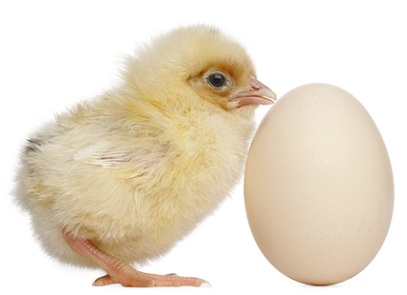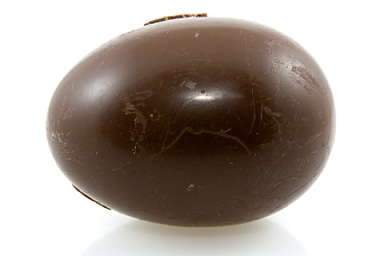Just as you were ready to tuck into a nice three-egg omelet again,
comforted by the reassuring news that eggs are not so bad for you, here
comes a study warning that for those over 40, the number of egg yolks
consumed per week accelerates the thickening of arteries almost as
severely as does cigarette smoking.
Server, can you make that an egg-white omelet instead, please?
The study, published Tuesday in the journal Atherosclerosis, measured the carotid wall thickness -- a key indicator of heart disease risk -- of 1,231 patients referred to a vascular prevention clinic, and asked each to detail a wide range of their health habits, from smoking and exercise to their consumption of egg yolks. Just as smoking is often tallied as "pack-years" (the number of cigarette packs smoked per day for how many years), egg-yolk consumption was tallied as "egg yolk years" (the number of egg yolks consumed per week times the number of years they were eaten).
The study subjects were typically referred to the clinic after having suffered a clot-induced stroke or a transient ischemic attack -- a "mini-stroke" in which symptoms may disappear quickly but which often presage a more serious stroke to come.
Smoking tobacco and eating egg yolks increased carotid wall thickness in similar fashion -- which is to say, the rate of increase accelerated with each stair-step up in cigarette smoking or yolk consumption. By contrast, for those who did not smoke, or who rarely consumed egg yolks, carotid wall thickness increased after 40, but at a slow-steady rate.
For those whose consumption of whole eggs was in the highest 20%, the narrowing of the carotid artery was on average about two-thirds that of the study's heaviest smokers.
"We believe our study makes it imperative to reassess the role of egg yolks, and dietary cholesterol in general, as a risk factor for coronary heart disease," the study authors write.
In recent years, nutritionists have begun to agree with egg purveyors that chicken eggs -- cheap and packed with protein -- have gotten a bad rap as a dangerous source of cholesterol. Some studies have suggested that eggs may increase HDL, or "good cholesterol" that protects against heart disease, even as it contributes to the artery-clogging LDL cholesterol, making egg consumption something of a wash. And regular egg-eaters may form larger lipoprotein particles that help clear the blood of fat particles and are not as likely to settle in artery walls.
Still, the National Heart Blood and Lung Institute recommends that to limit their risk of developing heart disease, Americans limit their cholesterol intake to no more than 300 mg per day (an egg yolk has just over 200 mg), and eat no more than four whole eggs weekly, including those in baked goods or processed foods. Those who already have heart disease, diabetes or high LDL-cholesterol, or who have had a stroke, should limit their cholesterol to less than 200 mg per day.
 It’s Not Just the Cholesterol That Scrambles Your Health
It’s Not Just the Cholesterol That Scrambles Your Health
One of my most stomach-churning childhood experiences was cracking an egg for cooking and finding a partially formed chick fetus inside. I screamed in horror and threw it in the trash. No one else was in the kitchen with me. I learned at that point that it’s pointless to ask “which came first, the chicken or the egg?”
In fact, chickens and eggs are interchangeable. An egg is a disassembled chick, since everything needed to form the baby bird is inside the egg. The shell forms a casing that allows the contents of the egg, under proper conditions, to rearrange themselves into a baby bird who will hatch and grow into a reproducing member of his or her species.
The hideous conditions of chickens on factory farms has been widely reported, so many aim to eat supposedly “kinder” eggs that are labeled “free range” or “cage free” or a similar soothing label. These terms are not regulated and have no meaning. Most often, chickens suffer terribly to lay these eggs for commercial production. The laying hens must be replaced, and the male chicks who hatch to replace them are killed at birth since they have no profitable use. Often the tiny babies are ground up alive.
Still, some insist they get their eggs from rescued chickens who are treated like much-loved pets. What could be wrong with that? For starters, these eggs have the potential to harm your health and weight, just as all eggs do. Here are seven reasons to choose a non-egg breakfast.
ONE. The USDA National Nutrient Database records that a whole, cooked, hard-boiled egg has 155 calories, no fiber, and 10.6 grams of fat. Of this, about a third is saturated fat. Since the egg has no fiber, it
 will activate your stomach’s stretch receptors for fullness only to
the extent of the volume of the egg itself, which is pretty small
considering your stomach is a bit bigger than a liter. You could get so
many more nutrients and satisfaction from fiber by eating 155 calories
of whole plant foods, such as apples, black beans, or brown rice.
will activate your stomach’s stretch receptors for fullness only to
the extent of the volume of the egg itself, which is pretty small
considering your stomach is a bit bigger than a liter. You could get so
many more nutrients and satisfaction from fiber by eating 155 calories
of whole plant foods, such as apples, black beans, or brown rice.
TWO. Eggs contribute almost as much to the growth of plaque blocking your arteries as smoking does, according to a 2012 study. This study focused on egg yolks, and found that yolk consumption accelerated the development of the deadly plaque that causes heart attacks and strokes.
THREE. Eating eggs measurably increases the risk of developing type 2 diabetes. For example, a recent study found that eating 3 to 5 eggs a week doubled the chances of becoming diabetic, and those eating 5 or more eggs a week had three times the risk of this deadly disease.
FOUR. The incidence of nonalcoholic fatty liver disease is soaring. The fats in eggs may directly harm your liver, contributing to cell death, inflammation, and eventually deadly liver cirrhosis. The cholesterol concentrated in egg yolk can directly harm your liver as well.
FIVE. Endotoxins, which can cause destructive inflammation in your body, are poisonous substances in bacteria that are released when the bacteria die. This inflammation fuels cardiovascular disease and chronic illnesses ranging from headaches to arthritis to autoimmune disease, Alzheimer’s disease, and cancer. Fat helps transports endotoxins into your body – and recall that eggs are high in fat.
SIX. Got salmonella, a disease-causing bacteria that causes nasty food poisoning? Salmonella bacteria, according to the Centers for Disease Control (CDC), are frequently found on the outside as well as on the inside of eggs. The CDC recommends eating only thoroughly cooked eggs and tells you to “wash hands and all food contact surface areas (counter tops, utensils, dishes, and cutting boards) with soap and water
after contact with raw eggs. Then disinfect the food contact surfaces using a sanitizing agent, such as bleach, following label instructions.” Do you really want to go to all this trouble every time you touch an egg, or have something so full of bacteria in your refrigerator?
SEVEN. Don’t think you are home clear if you just eat egg whites, which have no cholesterol. Instead, egg whites are dense sources of animal protein, which itself directly raises cholesterol. The body sees bits of absorbed egg protein as a foreign invader, which can activate your immune system, again directly increasing inflammation and the risk of chronic illness.
Forget being plagued by indecision in trying to chose the “kindest” egg or justifying to yourself eating the reproductive materials of rescued birds. When you consider your own health, you’ll choose scrambled tofu with veggies for breakfast instead of scrambled eggs. With just the right amount of turmeric, the tofu has a
color virtually identical to eggs and is delicious. Recipes abound online for this delight, and well as animal-free pancakes, waffles, French toast, and other breakfast choices. For baking, search for plant-based egg replacements, which are numerous, and all healthier and lower calorie than eggs are.
Chicks, whether assembled into birds or disassembled in eggs, are not an appetizing or health promoting food. Give them up for a few weeks, give your tastes a transition period to change, and you’ll see what I mean. A whole foods, plant-based diet can quickly become your first choice. Your body will thank you, and so will the birds.
Intrigued? Now you can use our Whole Foods Blog Finder to target informative, fun postings on whole foods, plant-based diets. Quick information at no cost!
Blog posting by Janice Stanger, Ph.D. Janice authored The Perfect Formula Diet: How to Lose Weight and Get Healthy Now With Six Kinds of Whole Foods. The book describes a simple diet built on whole plant foods that can prevent, and even reverse, most chronic disease. Janice has not eaten eggs since 2000, and is relieved and happy to be free of this gooey food.
The study, published Tuesday in the journal Atherosclerosis, measured the carotid wall thickness -- a key indicator of heart disease risk -- of 1,231 patients referred to a vascular prevention clinic, and asked each to detail a wide range of their health habits, from smoking and exercise to their consumption of egg yolks. Just as smoking is often tallied as "pack-years" (the number of cigarette packs smoked per day for how many years), egg-yolk consumption was tallied as "egg yolk years" (the number of egg yolks consumed per week times the number of years they were eaten).
The study subjects were typically referred to the clinic after having suffered a clot-induced stroke or a transient ischemic attack -- a "mini-stroke" in which symptoms may disappear quickly but which often presage a more serious stroke to come.
Smoking tobacco and eating egg yolks increased carotid wall thickness in similar fashion -- which is to say, the rate of increase accelerated with each stair-step up in cigarette smoking or yolk consumption. By contrast, for those who did not smoke, or who rarely consumed egg yolks, carotid wall thickness increased after 40, but at a slow-steady rate.
For those whose consumption of whole eggs was in the highest 20%, the narrowing of the carotid artery was on average about two-thirds that of the study's heaviest smokers.
"We believe our study makes it imperative to reassess the role of egg yolks, and dietary cholesterol in general, as a risk factor for coronary heart disease," the study authors write.
In recent years, nutritionists have begun to agree with egg purveyors that chicken eggs -- cheap and packed with protein -- have gotten a bad rap as a dangerous source of cholesterol. Some studies have suggested that eggs may increase HDL, or "good cholesterol" that protects against heart disease, even as it contributes to the artery-clogging LDL cholesterol, making egg consumption something of a wash. And regular egg-eaters may form larger lipoprotein particles that help clear the blood of fat particles and are not as likely to settle in artery walls.
Still, the National Heart Blood and Lung Institute recommends that to limit their risk of developing heart disease, Americans limit their cholesterol intake to no more than 300 mg per day (an egg yolk has just over 200 mg), and eat no more than four whole eggs weekly, including those in baked goods or processed foods. Those who already have heart disease, diabetes or high LDL-cholesterol, or who have had a stroke, should limit their cholesterol to less than 200 mg per day.

You
no longer need to wonder whether the chicken or the egg came first.
They are interchangeable. An egg is a disassembled baby bird just
waiting to form into a miraculous being.
One of my most stomach-churning childhood experiences was cracking an egg for cooking and finding a partially formed chick fetus inside. I screamed in horror and threw it in the trash. No one else was in the kitchen with me. I learned at that point that it’s pointless to ask “which came first, the chicken or the egg?”
In fact, chickens and eggs are interchangeable. An egg is a disassembled chick, since everything needed to form the baby bird is inside the egg. The shell forms a casing that allows the contents of the egg, under proper conditions, to rearrange themselves into a baby bird who will hatch and grow into a reproducing member of his or her species.
The hideous conditions of chickens on factory farms has been widely reported, so many aim to eat supposedly “kinder” eggs that are labeled “free range” or “cage free” or a similar soothing label. These terms are not regulated and have no meaning. Most often, chickens suffer terribly to lay these eggs for commercial production. The laying hens must be replaced, and the male chicks who hatch to replace them are killed at birth since they have no profitable use. Often the tiny babies are ground up alive.
Still, some insist they get their eggs from rescued chickens who are treated like much-loved pets. What could be wrong with that? For starters, these eggs have the potential to harm your health and weight, just as all eggs do. Here are seven reasons to choose a non-egg breakfast.
ONE. The USDA National Nutrient Database records that a whole, cooked, hard-boiled egg has 155 calories, no fiber, and 10.6 grams of fat. Of this, about a third is saturated fat. Since the egg has no fiber, it

Whole plant foods are way more filling, satisfying, tasty, and appealing than a gooey, fat-laden egg
TWO. Eggs contribute almost as much to the growth of plaque blocking your arteries as smoking does, according to a 2012 study. This study focused on egg yolks, and found that yolk consumption accelerated the development of the deadly plaque that causes heart attacks and strokes.
THREE. Eating eggs measurably increases the risk of developing type 2 diabetes. For example, a recent study found that eating 3 to 5 eggs a week doubled the chances of becoming diabetic, and those eating 5 or more eggs a week had three times the risk of this deadly disease.
FOUR. The incidence of nonalcoholic fatty liver disease is soaring. The fats in eggs may directly harm your liver, contributing to cell death, inflammation, and eventually deadly liver cirrhosis. The cholesterol concentrated in egg yolk can directly harm your liver as well.
FIVE. Endotoxins, which can cause destructive inflammation in your body, are poisonous substances in bacteria that are released when the bacteria die. This inflammation fuels cardiovascular disease and chronic illnesses ranging from headaches to arthritis to autoimmune disease, Alzheimer’s disease, and cancer. Fat helps transports endotoxins into your body – and recall that eggs are high in fat.
SIX. Got salmonella, a disease-causing bacteria that causes nasty food poisoning? Salmonella bacteria, according to the Centers for Disease Control (CDC), are frequently found on the outside as well as on the inside of eggs. The CDC recommends eating only thoroughly cooked eggs and tells you to “wash hands and all food contact surface areas (counter tops, utensils, dishes, and cutting boards) with soap and water
after contact with raw eggs. Then disinfect the food contact surfaces using a sanitizing agent, such as bleach, following label instructions.” Do you really want to go to all this trouble every time you touch an egg, or have something so full of bacteria in your refrigerator?
SEVEN. Don’t think you are home clear if you just eat egg whites, which have no cholesterol. Instead, egg whites are dense sources of animal protein, which itself directly raises cholesterol. The body sees bits of absorbed egg protein as a foreign invader, which can activate your immune system, again directly increasing inflammation and the risk of chronic illness.
Forget being plagued by indecision in trying to chose the “kindest” egg or justifying to yourself eating the reproductive materials of rescued birds. When you consider your own health, you’ll choose scrambled tofu with veggies for breakfast instead of scrambled eggs. With just the right amount of turmeric, the tofu has a
color virtually identical to eggs and is delicious. Recipes abound online for this delight, and well as animal-free pancakes, waffles, French toast, and other breakfast choices. For baking, search for plant-based egg replacements, which are numerous, and all healthier and lower calorie than eggs are.
Chicks, whether assembled into birds or disassembled in eggs, are not an appetizing or health promoting food. Give them up for a few weeks, give your tastes a transition period to change, and you’ll see what I mean. A whole foods, plant-based diet can quickly become your first choice. Your body will thank you, and so will the birds.
Intrigued? Now you can use our Whole Foods Blog Finder to target informative, fun postings on whole foods, plant-based diets. Quick information at no cost!
Blog posting by Janice Stanger, Ph.D. Janice authored The Perfect Formula Diet: How to Lose Weight and Get Healthy Now With Six Kinds of Whole Foods. The book describes a simple diet built on whole plant foods that can prevent, and even reverse, most chronic disease. Janice has not eaten eggs since 2000, and is relieved and happy to be free of this gooey food.



Δεν υπάρχουν σχόλια:
Δημοσίευση σχολίου